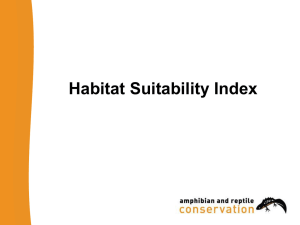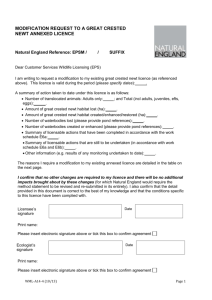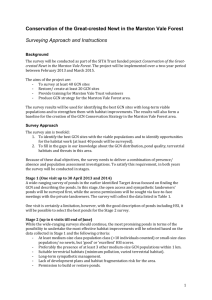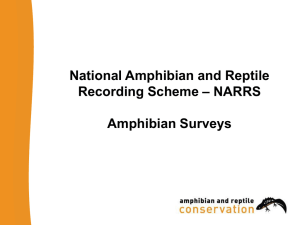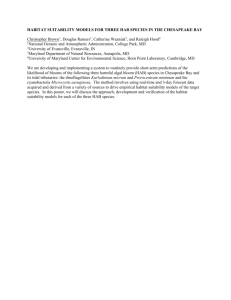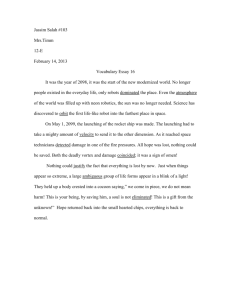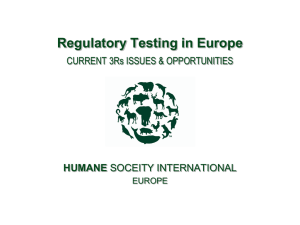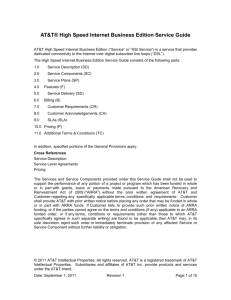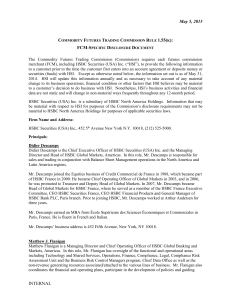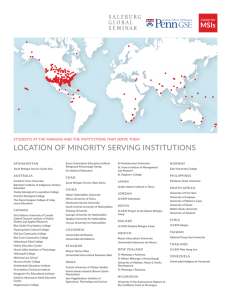P00508 Bawtry Road Great Crested Newt Habitat Suitability Index
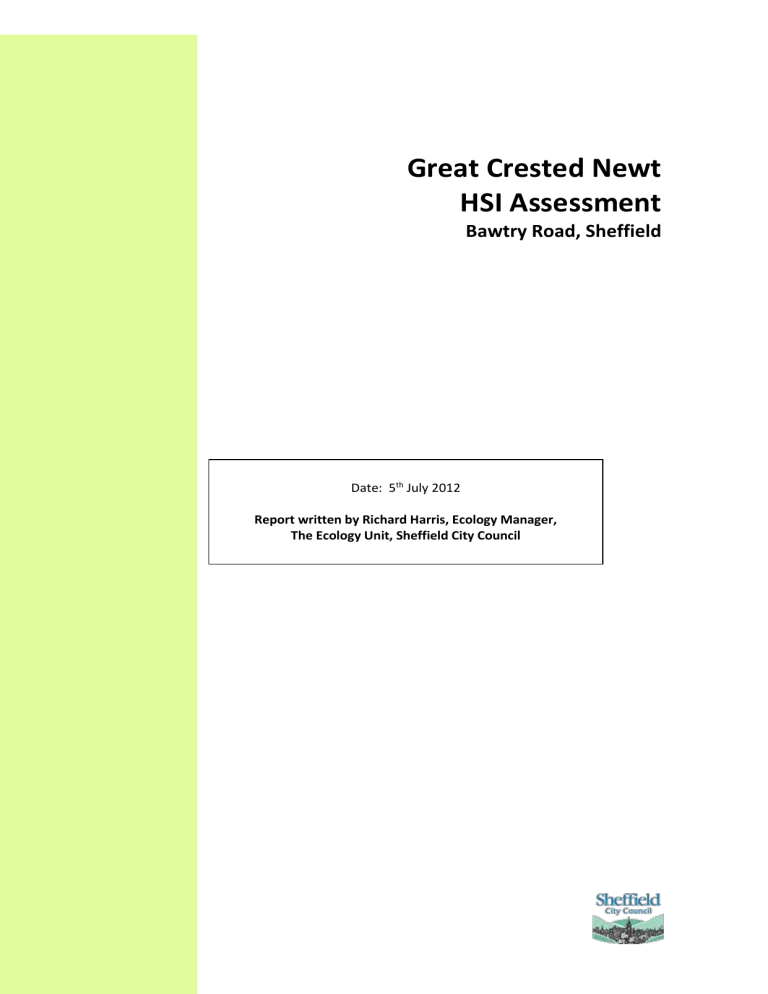
Great Crested Newt
HSI Assessment
Bawtry Road, Sheffield
Date: 5 th July 2012
Report written by Richard Harris, Ecology Manager,
The Ecology Unit, Sheffield City Council
Great Crested Newt HSI, Former Sports Ground,
Bawtry Road, Sheffield
July 2012
CONTENTS
2.0 Relevant legislation, policy and status ……………………………………………….. 3
3.0 Methodology.…
.
………………………………………….
.
……..……………………………….3
4.0 Constraints ……… …………………………………………………………………………………….4
5.0 Results.………………………………………………………………………………………………..4
6.0 Conclusions and Recommendations…………………………………………………….
.
4
| 2
Great Crested Newt HSI, Former Sports Ground,
Bawtry Road, Sheffield
July 2012
1.0 Introduction.
1.1 The Sheffield Ecology Unit was commissioned by SCC Forward Planning Service to carry out an assessment of habitat suitability for Great Crested Newts Triturus cristatus at a pond at Former Sports Ground, Bawtry Road, Tinsley (Grid Reference: SK 41129 89992).
A Habitat Suitability Index (HSI) (Oldham et al. 2000) assessment was undertaken to evaluate the potential for the pond to support great crested newt (GCN). This assessment forms part of the broader ecological assessment of quality and quantity of the site and should be read in conjunction with the extended Phase 1 Habitat Survey
(June 2012) carried out by the Sheffield Ecology Unit.
1.2 This report sets out the findings of the survey and assessment. It also makes recommendations for habitat management and the need for any further survey work.
2.0 Relevant legislation, policy and status.
2.1 The great crested newt is strictly protected under the Wildlife & Countryside Act
1981 (as amended) and the Conservation (Natural Habitats &c.) Regulations 1994 (as amended). Capturing, disturbing, injuring and killing newts are prohibited, as is damaging or destroying their breeding sites and resting places (This is a summary only, for a full interpretation of the law the reader is referred to the actual legislation).
2.2 GCN’s are listed under the Natural Environment and Rural Communities Act 2006
Section 41: Species of Principal Importance in England. Local Planning Authorities should give specific consideration to this species in dealing with planning and development control function, in particular its conservation and enhancement.
3.0 Methodology.
3.1 The Habitat Suitability Index (HSI) is a measure of habitat suitability for great crested newts. Both in the field and from map work (field scores) ten factors were scored for the target pond. These are:
Factor 1: Geographic location
Factor 2: Pond area
Factor 3: Permanence
Factor 4: Water quality
Factor 5: Shade
Factor 6: Waterfowl
Factor 7: Fish
Factor 8: Pond count (number of ponds within 1km of survey pond)
Factor 9: Terrestrial habitat
Factor 10: Macrophytes
| 3
Great Crested Newt HSI, Former Sports Ground,
Bawtry Road, Sheffield
July 2012
3.2 From this the geometric mean of ten suitability indices is calculated. Values close to 0 indicate unsuitable habitat, 1 represents optimal habitat. In general, ponds with high
HSI scores are more likely to support GCN’s than those with low scores.
3.3 The assessment was carried out on 25 th June 2012, within the optimal period for carrying out an HSI assessment.
4.0 Constraints.
4.1 A HSI assessment is not a substitute for newt surveys such as torching and trapping.
Although, ponds with high HSI scores are more likely to support GCN’s than those with low scores, the system is not precise enough to definitively indicate presence or absence; however a HSI assessment will help scope out the need for more detailed surveys.
4.2 It was not possible to do an assessment of numbers of garden ponds within a 1km radius.
5.0 Results
5.1 Using the HSI methodology the pond was assessed to be ‘good’ suitability for GCN.
Details of the calculation can be found in the HSI Table in the Appendix.
6.0 Conclusions and Recommendations
6.1 The pond was assessed to be ‘good’ suitability for GCN. It is recommended that if the site is considered to be allocated for development that further field surveys for great crested newt are carried out. Surveys should follow an appropriate methodology and be carried out at the correct time of year to ensure legal compliance, and to make the appropriate level of mitigation and enhancement to comply with the National Planning
Policy Framework. A local biological records search should also be carried out.
6.2 Planning authorities are required to take account of great crested newts when considering planning permission, and may refuse applications on the basis of an adverse effect on newt populations. Insufficient appraisals can lead to delays or a refusal of planning permission. When granting permission, planning conditions or Section 106 agreements may be used to help ensure appropriate mitigation and aftercare.
| 4
Great Crested Newt HSI, Former Sports Ground,
Bawtry Road, Sheffield
July 2012
Bibliography.
Amphibian and Reptile Groups of the United Kingdom, (May 2010) Great Crested Newt Habitat
Suitability Index, ARG UK Advice Note 5.
English Nature, (2001) Great Crested Newt mitigation guidelines, English Nature, Peterborough.
Defra and Natural England EXPLANATORY NOTE Section 41 of the Natural Environment and
Rural Communities (NERC) Act 2006 - Habitats and Species of Principal Importance in England,
Purpose and use of the England Biodiversity List
| 5
Great Crested Newt HSI, Former Sports Ground,
Bawtry Road, Sheffield
July 2012
Appendix - Results
HSI Assessment Table
Site Grid ref
HSI criteria
Geo
Location
Pond
Area
Permanence Water quality
Shade Waterfowl Fish Pond count
Terrestrial habitat
Macrophytes HSI
Sum
Final
HSI
Score
Prediction
(Likelihood of GCN)
Former
Sports
Ground,
Bawtry
Rd
SK
41129
89992
Indice 1 0.9 0.9 0.67 0.2 1 1
Category Zone A 4,689m2 Never dries Moderate 100% Absent* Absent
(*moorhen may be present)
0.4
1
1
Good
0.9
90%
0.04 0.72 Good
| 6
